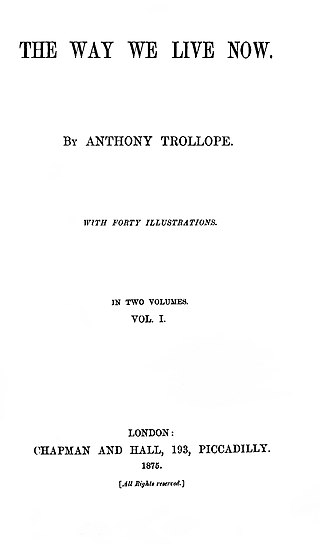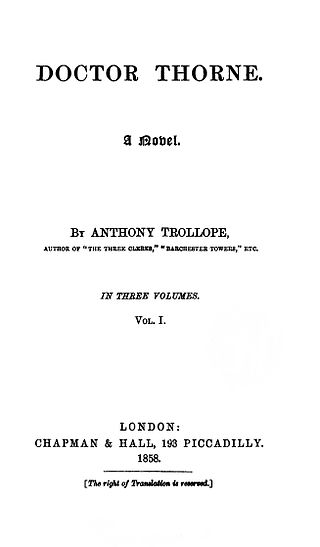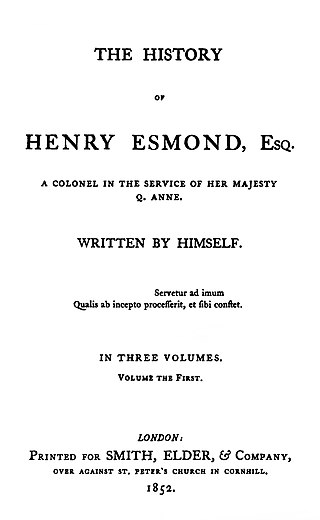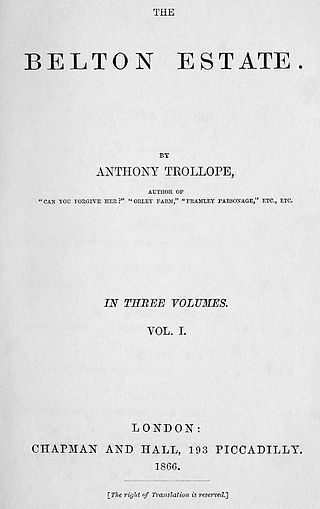
The History of Tom Jones, a Foundling, often known simply as Tom Jones, is a comic novel by English playwright and novelist Henry Fielding. It is a Bildungsroman and a picaresque novel. It was first published on 28 February 1749 in London and is among the earliest English works to be classified as a novel. It is the earliest novel mentioned by W. Somerset Maugham in his 1948 book Great Novelists and Their Novels among the ten best novels of the world.
An heir presumptive is the person entitled to inherit a throne, peerage, or other hereditary honour, but whose position can be displaced by the birth of a person with a better claim to the position in question. This is in contrast to an heir apparent, whose claim on the position cannot be displaced in this manner.

The Way We Live Now is a satirical novel by Anthony Trollope, published in London in 1875 after first appearing in serialised form. It is one of the last significant Victorian novels to have been published in monthly parts.

The Adventure of the Christmas Pudding and a Selection of Entrées is a short story collection written by Agatha Christie and first published in the UK by the Collins Crime Club on 24 October 1960. It is the only Christie first edition published in the UK that contains stories with both Hercule Poirot and Miss Marple, the writer's two most famous detectives. It retailed in the UK for twelve shillings and sixpence (12/6) and comprises six cases. It was not published in the US although the stories it contains were published in other volumes there.

Doctor Thorne is a novel by the English author Anthony Trollope, published in 1858. It is the third book in his Chronicles of Barsetshire series, between Barchester Towers and Framley Parsonage. The idea of the plot was suggested to Trollope by his brother Thomas. Michael Sadleir places it as one of the five best of Trollope's novels and the best of the Barsetshire novels.

Can You Forgive Her? is a novel by Anthony Trollope, first published in serial form in 1864 and 1865. It is the first of six novels in the Palliser series, also known as the Parliamentary Novels.

The History of Henry Esmond is a historical novel by William Makepeace Thackeray, originally published in 1852. The book tells the story of the early life of Henry Esmond, a colonel in the service of Queen Anne of England. A typical example of Victorian historical novels, Thackeray's work of historical fiction tells its tale against the backdrop of late 17th- and early 18th-century England – specifically, major events surrounding the English Restoration – and utilises characters both real and imagined. It weaves its central character into a number of events such as the Glorious Revolution, the War of the Spanish Succession, the Hamilton–Mohun Duel and the Hanoverian Succession.
The Palliser novels are six novels written in series by Anthony Trollope. They were more commonly known as the Parliamentary novels prior to their 1974 television dramatisation by the BBC broadcast as The Pallisers. Marketed as "polite literature" during their initial publication, the novels encompass several literary genres including: family saga, bildungsroman, picaresque, as well as satire and parody of Victorian life, and criticism of the British government's predilection for attracting corrupt and corruptible people to power.

The Pallisers is a 1974 BBC television adaptation of Anthony Trollope's Palliser novels. Set in Victorian era England with a backdrop of parliamentary life, Simon Raven's dramatisation covers six novels and follows the events and characters over two decades.

Tom Jones is a comic opera in three acts by Edward German founded upon Henry Fielding's 1749 novel, The History of Tom Jones, a Foundling, with a libretto by Robert Courtneidge and Alexander M. Thompson and lyrics by Charles H. Taylor.

He Knew He Was Right is an 1869 novel written by Anthony Trollope which describes the failure of a marriage caused by the unreasonable jealousy of a husband exacerbated by the stubbornness of a willful wife. As is common with Trollope's works, there are also several substantial subplots. Trollope makes constant allusions to Shakespeare's Othello throughout the novel. Trollope considered this work to be a failure; he viewed the main character as unsympathetic, and the secondary characters and plots as much more lively and interesting, but it is one of his best-known novels. It was adapted for BBC One in 2004 by Andrew Davies.
Richard Benyon De Beauvoir was a 19th-century British politician, landowner, philanthropist, and High Sheriff of Berkshire.

Henry Crawford is one of the main characters in Jane Austen's 1814 novel, Mansfield Park. He is depicted as a man who, though not conventionally handsome, has great charisma. He is lively, witty and charming, a great asset at dinner parties, and admired by nearly all. Henry and his sister bring a fresh energy to the rather dour and oppressive atmosphere of Mansfield Park. At Sotherton his potential for disruption begins to emerge.
The American Senator is a novel written in 1877 by Anthony Trollope. Although not one of Trollope's better-known works, it is notable for its depictions of rural English life and for its many detailed fox hunting scenes. In its anti-heroine, Arabella Trefoil, it presents a scathing but ultimately sympathetic portrayal of a woman who has abandoned virtually all scruples in her quest for a husband. Through the eponymous Senator, Trollope offers comments on the irrational aspects of English life.

Ralph the Heir is a novel by Anthony Trollope, originally published in 1871. Although Trollope described it as "one of the worst novels I have written", it was well received by contemporary critics. More recently, readers have found it noteworthy for its account of a corrupt Parliamentary election, an account based closely on Trollope's own experience as a candidate.

The Belton Estate is a novel by Anthony Trollope, published first in 1865. The novel concerns itself with a young woman who has accepted one of two suitors, then discovered that he was unworthy of her love. It was the first novel published in the Fortnightly Review.

The Vicar of Bullhampton is an 1870 novel by Anthony Trollope. It is made up of three intertwining subplots: the courtship of a young woman by two suitors; a feud between the titular broad church vicar and a low church nobleman, abetted by a Methodist minister; and the vicar's attempt to rehabilitate a young woman who has gone astray.
Jim Hawkins and the Curse of Treasure Island is a 2001 adventure novel by Frank Delaney, written under the pseudonym of Francis Bryan. It is a sequel to the 1883 novel Treasure Island by Robert Louis Stevenson.
Giwn Lloyd, 18th Baron of Hendwr (1699–1774) and squire of Tyfos, in the county of Merioneth and of Gwersyllt Park and Plas Newydd, in the county of Denbigh, was a Welsh gentleman who lived in the 18th century and was notorious for his dissolute life. He is best remembered for the lengthy court battle which ensued after his death, lasting over twenty years, exhausting the finances of many of his kinsmen, and shocking much of Welsh society.

The Tractate Middoth is a short film which is part of the British supernatural anthology series A Ghost Story for Christmas. Produced by Susie Liggat, it is the first instalment to be written and directed by Mark Gatiss, who has helmed every subsequent episode as of 2023. It is based on the ghost story of the same name by M. R. James, first published in the collection More Ghost Stories (1911), and first aired on BBC Two on 25 December 2013.













